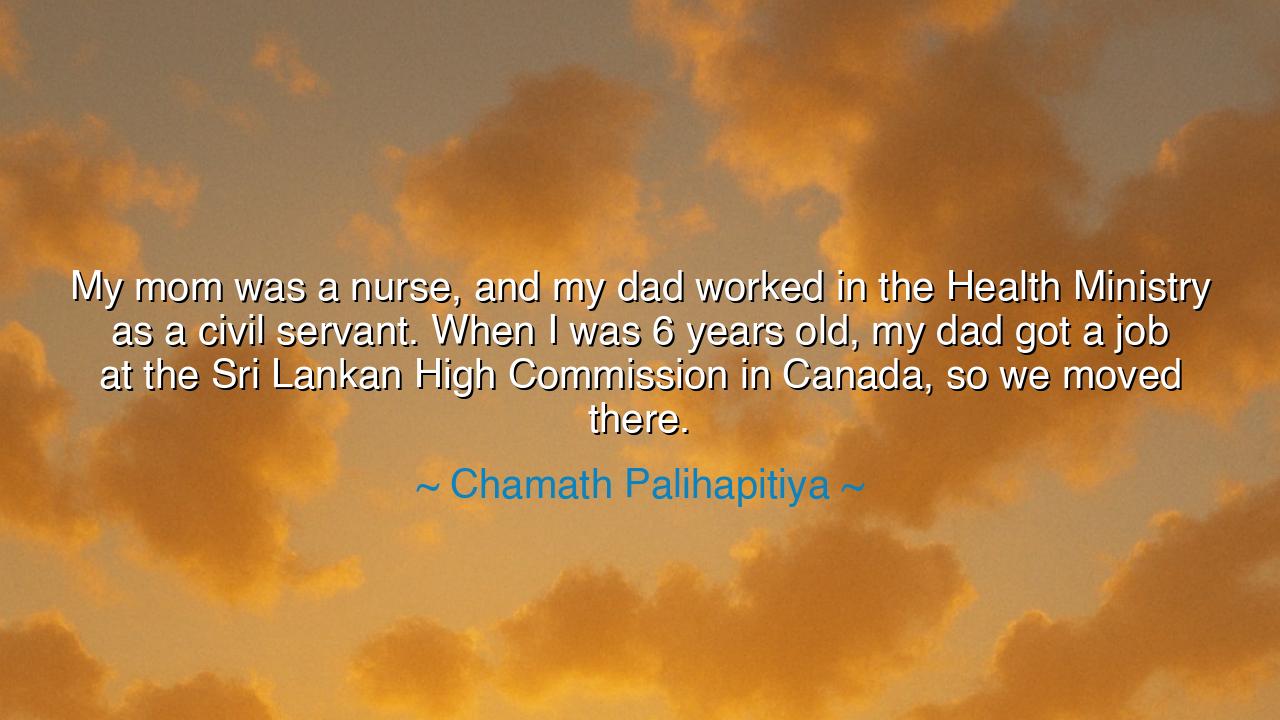
My mom was a nurse, and my dad worked in the Health Ministry as a
My mom was a nurse, and my dad worked in the Health Ministry as a civil servant. When I was 6 years old, my dad got a job at the Sri Lankan High Commission in Canada, so we moved there.






In the vast tapestry of human destiny, there are moments when a single change of place alters the course of a soul forever. So it was with Chamath Palihapitiya, who once said: “My mom was a nurse, and my dad worked in the Health Ministry as a civil servant. When I was 6 years old, my dad got a job at the Sri Lankan High Commission in Canada, so we moved there.” At first glance, his words seem simple — a recollection of family and circumstance — yet within them lies a profound truth about the journey of migration, the shaping of identity, and the quiet strength of those who walk between worlds. For in this modest memory is contained the eternal story of movement: the leaving of one land and the learning of another, the blending of past and future into the forge of self.
To be born in one place and raised in another is to live between two suns. Chamath’s parents, like so many before them, carried the spirit of service — a mother tending to the sick as a nurse, a father laboring for the good of his nation as a civil servant. Their work was humble, yet sacred, for it was built upon duty and compassion. When his father accepted a post in a foreign land, they did not know what awaited them; only that it was a chance — a chance for stability, for education, for a broader horizon for their child. Thus, at six years old, Chamath crossed the sea, and with him crossed the hopes of generations. Behind him lay the familiar warmth of Sri Lanka, and before him stretched the vast, cold promise of Canada — a world of snow, order, and opportunity.
Every immigrant child carries this paradox: they are at once rooted and uprooted. They belong to two homelands yet are claimed by neither. In this tension lies both pain and power. The child of migration learns early the art of adaptation — to listen before speaking, to observe before acting, to hold two languages in one mouth and two cultures in one heart. It is in this crucible that resilience is born. For the world, though wide, is not always welcoming, and the road to belonging is seldom straight. Yet, like iron sharpened by fire, the soul that endures becomes unbreakable. Palihapitiya’s journey from the child of civil servants to a titan of technology is not a tale of sudden fortune, but of the enduring strength learned in the shadows of transition.
Think of another who crossed borders to shape destiny: Andrew Carnegie, born in the poverty of Scotland, raised in the steel mills of America. Like Chamath, his parents carried the dreams of service and survival. He began with little but rose to transform entire industries. His journey, too, began with a move — a migration that was not just of geography, but of spirit. Such stories remind us that displacement is not always a curse. It can be a summons — a calling to remake oneself in the face of uncertainty, to turn loss into leadership and distance into vision.
Chamath’s recollection of his parents’ professions is more than filial pride — it is an invocation of heritage and humility. The nurse and the civil servant are symbols of those who build nations quietly, not through wealth or power, but through compassion and duty. From such parents, he learned that greatness is not born in luxury, but in purpose. It is a truth the ancients would have understood well: that the noblest work is service, and that those who serve with sincerity build legacies stronger than empires. When their son later rose to prominence in the world of technology and finance, he carried their lessons within him — the understanding that progress without compassion is hollow, and success without service is meaningless.
Yet there is another layer still — one that speaks to the essence of identity in the modern age. When Chamath Palihapitiya left his homeland, he carried more than memory; he carried the unspoken duty of the diaspora — to bridge worlds. In every immigrant heart, there beats a dual rhythm: one of remembrance, and one of renewal. The ancients called this the hero’s journey — the path of those who depart the known world, face its trials, and return transformed. So it is with every child of migration: they are the messengers between cultures, the living proof that humanity is one tribe scattered across many shores.
Let us, then, take this story as both reminder and commandment. Honor the roots from which you came, for they are your grounding in all tempests. Serve, as Chamath’s parents did, with integrity and compassion, for these are the virtues that outlast all titles. And when life calls you to new lands — whether of body, mind, or destiny — go with courage. For movement is the essence of growth, and change the mother of wisdom. Remember always that where you begin does not define where you end, but how deeply you carry your origins within your heart.
For the lesson of Chamath Palihapitiya’s words is eternal: that greatness is often born quietly, in the choices of those who serve, in the sacrifices of parents, and in the journeys of children who cross oceans. The world may celebrate success, but the wise will always bow first to its roots — to the nurse, to the civil servant, to the courage of those who left home so their children could find the world.






AAdministratorAdministrator
Welcome, honored guests. Please leave a comment, we will respond soon